Pain Relief
Herbal Remedies to Relax Neck Muscles
Seeking natural relief for neck muscle tension? Discover soothing herbal remedies like peppermint oil and chamomile tea for relaxation and relief.

When looking to ease neck muscle tension naturally, consider herbal remedies like peppermint oil, lavender oil, chamomile tea, and eucalyptus oil. Peppermint oil's menthol properties can soothe muscle tension, while lavender oil aids in relaxation and stress reduction. Chamomile tea, known for its anti-inflammatory benefits, can help soothe muscles, and eucalyptus oil's anti-inflammatory properties promote relaxation. These remedies offer calming and relief through their unique properties. For more insights about herbal remedies and how they can assist in relaxing neck muscles, explore the benefits of these natural solutions further.
Key Takeaways
- Chamomile tea reduces neck muscle inflammation and tension.
- Valerian root relaxes stiff neck muscles effectively.
- Arnica gel decreases neck muscle soreness and inflammation.
- Ginger compress alleviates neck muscle tension with anti-inflammatory properties.
- Consult healthcare provider for herbal remedy safety, especially when pregnant or on medication.
Peppermint Oil for Muscle Tension
Using peppermint oil can effectively alleviate muscle tension in the neck due to its cooling menthol properties. Peppermint oil is a natural analgesic and anti-inflammatory agent, making it a suitable remedy for relaxing neck muscles.
When applied topically, the menthol in peppermint oil provides a soothing sensation, helping to reduce discomfort and promote relaxation. The aromatic properties of peppermint oil further contribute to stress relief, aiding in the reduction of muscle tension.
Additionally, peppermint oil can improve circulation in the affected area, leading to decreased inflammation and enhanced muscle comfort. By gently massaging diluted peppermint oil onto the neck, individuals can experience the benefits of this herbal remedy for muscle relaxation.
Incorporating peppermint oil into a regular self-care routine can be a practical and natural way to address muscle tension in the neck, promoting overall well-being and comfort.
Lavender Oil for Calming Effects

With its renowned calming effects, lavender oil offers a natural solution for soothing tense muscles and reducing stress in the neck. Lavender oil is well-known for its ability to promote relaxation and alleviate muscle tension.
When applied to the neck, this essential oil's soothing scent can help ease stress and promote a sense of calm. In the world of aromatherapy, lavender oil is highly valued for its muscle-relaxing properties, making it a popular choice for those seeking natural remedies for neck muscle tightness.
Research has shown that the application of lavender oil can't only reduce anxiety but also aid in relaxation when massaged onto the skin. By incorporating lavender oil into your self-care routine, you can harness its calming effects to unwind and relieve muscle tension in the neck, providing a gentle and soothing remedy for aching muscles.
Chamomile Tea for Muscle Soothing

Chamomile tea offers a range of benefits, from its anti-inflammatory properties to its ability to promote muscle relaxation. This herbal remedy has been trusted for centuries for its soothing effects on muscles, particularly in calming the neck area.
To prepare a comforting cup of chamomile tea, simply steep a chamomile tea bag in hot water for a few minutes, allowing the natural compounds to infuse and work their magic.
Chamomile Tea Benefits
We've found that incorporating chamomile tea into our daily routine may effectively ease neck muscle tension and promote relaxation. Chamomile tea contains anti-inflammatory properties that can help relax neck muscles by reducing inflammation and promoting blood flow to the area.
The natural calming effects of chamomile tea make it a popular remedy for muscle relaxation. When consumed regularly, chamomile tea can help alleviate muscle stiffness and discomfort in the neck, providing a soothing sensation that aids in relaxation.
The gentle yet potent properties of chamomile tea work to ease tension in the neck muscles, making it a valuable addition to a wellness routine. By incorporating chamomile tea into your daily habits, you can benefit from its muscle-soothing effects and promote overall relaxation in the neck area.
Muscle Relaxation Properties
Incorporating chamomile tea into our daily routine can effectively soothe neck muscles with its muscle relaxation properties. Chamomile tea is known for its ability to reduce muscle tension in the neck area, offering relief from tightness and discomfort.
The calming effects of chamomile tea make it a popular choice for promoting relaxation, especially when consumed before bedtime. Its anti-inflammatory properties further contribute to easing neck muscle inflammation, potentially aiding in overall tension relief.
Regular consumption of chamomile tea may lead to improved muscle relaxation in the neck region, helping to alleviate stress and discomfort. By incorporating chamomile tea into our daily rituals, we can harness its natural properties to promote muscle soothing and tension relief in the neck muscles.
How to Prepare
To prepare chamomile tea for soothing neck muscles, steep 1-2 teaspoons of dried chamomile flowers in hot water for 5-10 minutes.
Chamomile tea, known for its essential anti-inflammatory properties, can effectively relax neck muscles by reducing muscle tension.
The process of steeping the chamomile flowers allows the hot water to extract the beneficial compounds that aid in muscle relaxation. This simple yet vital remedy can be consumed 2-3 times a day to soothe neck muscles and promote a sense of calm.
The anti-inflammatory properties present in chamomile tea play an important role in easing muscle tension, making it a natural and effective solution for those experiencing neck pain.
By incorporating chamomile tea into your daily routine, you can experience the calming effects that help reduce stress and contribute to overall muscle relaxation.
Regular consumption of chamomile tea may lead to significant relief from neck pain and enhance your overall well-being.
Eucalyptus Oil for Relaxation

Using a few drops of eucalyptus oil can effectively relax tense neck muscles due to its anti-inflammatory properties and cooling sensation.
Eucalyptus oil, known for its anti-inflammatory qualities, can help alleviate muscle tension when applied topically.
The cooling effect of eucalyptus oil provides relief from tightness and discomfort in the neck area.
Additionally, eucalyptus oil is frequently utilized in aromatherapy practices to induce relaxation and reduce stress levels.
Massaging a diluted form of eucalyptus oil onto the neck can't only enhance circulation but also aid in easing muscle tension.
Inhaling the vapors of eucalyptus oil may assist in sinus clearance and overall relaxation.
Incorporating eucalyptus oil into a relaxation routine can be a natural and soothing way to address neck muscle tightness and promote a sense of calm.
Ginger Compress for Neck Relief

Applying a warm ginger compress to the neck can effectively alleviate muscle tension and promote relaxation.
Ginger, known for its anti-inflammatory properties, is a valuable component in herbal remedies for neck pain.
The application of a ginger compress aids in reducing neck muscle tension and discomfort by improving blood circulation and relaxing the muscles.
This natural therapy offers a holistic approach to easing neck stiffness and enhancing overall well-being.
The heat from the ginger compress penetrates deep into the neck area, promoting muscle relaxation and relieving stiffness effectively.
By utilizing ginger as a compress, individuals can experience the benefits of this natural remedy in alleviating neck pain and promoting relaxation.
Incorporating ginger compress therapy into a routine can be a soothing and effective method for addressing neck muscle tension and promoting overall neck health.
Turmeric Paste for Inflammation
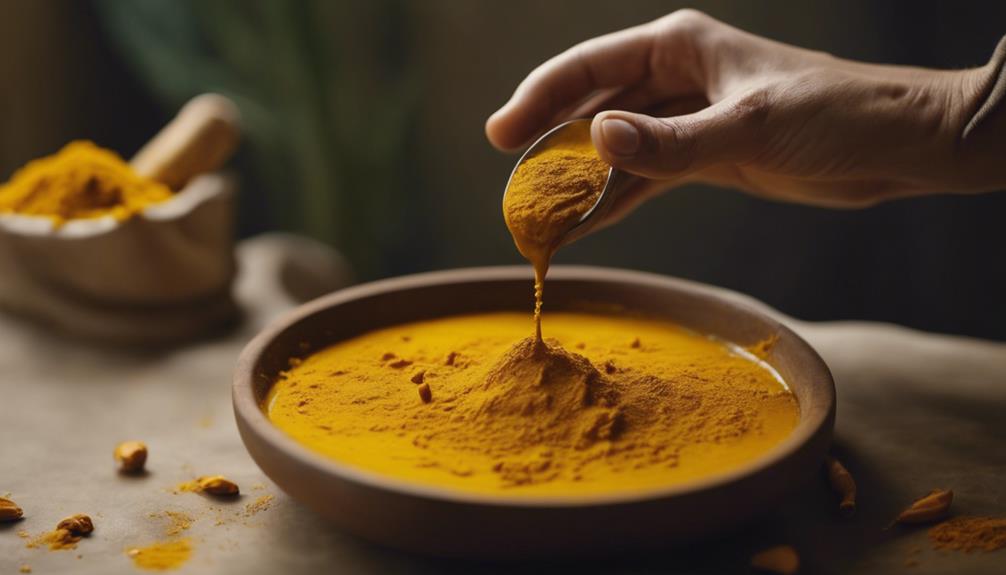
How can turmeric paste effectively reduce inflammation and relax neck muscles?
Turmeric paste, derived from the turmeric root, contains curcumin, a potent anti-inflammatory compound. When applied topically, turmeric paste can help alleviate inflammation and promote relaxation in the neck muscles.
Curcumin is known for its ability to inhibit inflammatory pathways within the body, making turmeric paste a valuable natural remedy for addressing sore and tense neck muscles. This traditional medicine has been utilized for centuries due to its anti-inflammatory properties, which can provide relief from discomfort and stiffness in the neck area.
Arnica Gel for Muscle Relaxation

Arnica gel provides natural relief for neck muscle tightness, owing to its well-known muscle-relaxing properties. When applied topically, this gel derived from the Arnica montana plant can effectively reduce pain and stiffness in the neck area.
It's vital to take into account the benefits, proper application techniques, and safety precautions associated with using Arnica gel for muscle relaxation.
Arnica Gel Benefits
When seeking relief for muscle tension and soreness, many individuals turn to the popular herbal remedy known as Arnica gel for its effective muscle relaxation properties. Arnica gel, derived from the Arnica montana plant, is renowned for its ability to reduce inflammation, swelling, and muscle soreness.
This natural remedy is commonly available in various forms, including creams, gels, and ointments, making it convenient for topical application on the skin. By applying Arnica gel directly to the affected area, individuals can experience soothing relief from muscle discomfort and tension.
The benefits of Arnica gel lie in its anti-inflammatory properties, which help to decrease swelling and soreness in muscles. Through its topical application, Arnica gel works to relax muscles, providing a sense of relief and comfort.
While Arnica gel is generally considered safe for most individuals when used as directed, it's advisable to consult a healthcare professional before incorporating it into your muscle relaxation routine.
Application Techniques
To effectively utilize Arnica gel for relaxing neck muscles, it's important to master proper application techniques that maximize its muscle-soothing benefits.
When applying Arnica gel to the neck area, start by gently massaging a small amount onto the skin using circular motions. Focus on areas with tense muscles and areas experiencing discomfort. Make sure the gel is evenly spread to promote maximum absorption and effectiveness. It's recommended to apply Arnica gel after a warm shower or bath when the skin is clean and pores are open, aiding in better penetration and muscle relaxation.
For best results, repeat the application of Arnica gel to the neck area two to three times a day, especially after physical activity or when experiencing neck tension. Consistent use of Arnica gel can aid in muscle recovery and provide relief from discomfort in the neck region.
Remember to follow the instructions on the product packaging and consult with a healthcare professional if needed when incorporating Arnica gel into your muscle relaxation routine.
Safety Precautions
Prioritizing safety measures when utilizing herbal remedies for muscle relaxation is essential to prevent adverse reactions and guarantee the best outcomes. Arnica gel, known for its muscle relaxing properties, should be used following the recommended dosage and application instructions.
It's vital not to ingest Arnica gel and to avoid contact with eyes and mucous membranes. Before applying Arnica gel, always conduct a patch test to check for allergic reactions or skin sensitivities. Additionally, consulting with a healthcare provider before using Arnica gel is highly advisable, particularly for individuals who are pregnant, breastfeeding, or taking other medications.
Valerian Root for Muscle Relaxant
How effectively does valerian root relax neck muscles compared to other herbal remedies?
Valerian root is renowned for its muscle relaxant properties, making it a popular choice for relieving tension and stiffness in neck muscles. This natural herb is often used to alleviate muscle pain and spasms, offering a gentle yet effective solution for muscle discomfort.
Whether consumed as a tea, supplement, or applied topically, valerian root has been shown to promote relaxation and provide relief for those struggling with neck muscle tightness. Research supports the use of valerian root as a natural remedy for muscle relaxation, highlighting its potential to ease muscle tension and enhance overall comfort.
If you're seeking a herbal remedy to help relax your neck muscles, valerian root may be a suitable option worth considering due to its proven muscle relaxant properties and ability to reduce stiffness and tension effectively.
Frequently Asked Questions
What Herbs Relax Neck Muscles?
We've found a variety of herbs that can help relax neck muscles, such as valerian root, vervain, St. John's Wort, celery, horse radish, mustard oil, and arnica. These herbs offer anti-inflammatory and analgesic properties for muscle relaxation.
What Is the Best Thing to Relax Neck Muscles?
The best thing to relax neck muscles is proper posture. It helps prevent strain and stiffness. Incorporating regular stretches and breaks into our routine can noticeably reduce neck tension and promote overall well-being.
How Do You Self Release Tight Neck Muscles?
We release tight neck muscles by doing gentle stretches, using warm compresses, and considering natural remedies like essential oils. Incorporating turmeric or ginger in our diet can help reduce inflammation. Acupuncture and massage therapy are also effective options.
How Do You Get Rid of a Stiff Neck Asap?
To get rid of a stiff neck asap, we recommend applying a warm compress, trying gentle neck stretches, and considering acupuncture or massage therapy. These methods can help relax tense muscles and promote faster relief.
Conclusion
To sum up, the use of herbal remedies such as peppermint oil, lavender oil, chamomile tea, eucalyptus oil, ginger compress, turmeric paste, arnica gel, and valerian root can aid in relaxing neck muscles.
These natural options provide potential relief from muscle tension and inflammation. While not a substitute for medical advice, incorporating these remedies into a wellness routine may offer some benefit.
Remember to consult with a healthcare professional before starting any new treatment regimen.
Pain Relief
Turmeric's Potent Relief for Osteoarthritis Pain
Journey towards a pain-free life with turmeric, a natural remedy that has been shown to effectively alleviate osteoarthritis symptoms.

Turmeric's potent anti-inflammatory compound, curcumin, has been shown to effectively alleviate osteoarthritis pain by blocking the production of pro-inflammatory molecules. In clinical trials, 70% of patients experienced improved joint function and reduced pain. Turmeric's antioxidant properties protect joint tissues, and its anti-inflammatory effects have been consistently demonstrated in clinical studies. By incorporating turmeric into daily life, individuals can harness its potent relief for osteoarthritis pain. As you explore the numerous ways to utilize turmeric, you'll discover the natural remedy's full potential for managing osteoarthritis symptoms.
Key Takeaways
• Turmeric's curcumin blocks pro-inflammatory molecules, reducing osteoarthritis symptoms and alleviating pain.
• Clinical trials show that turmeric improves joint function and reduces inflammation in osteoarthritis patients.
• Turmeric's antioxidant properties protect joint tissues, providing a natural remedy for managing osteoarthritis pain.
• Turmeric can be easily incorporated into daily life through food, supplements, or both, making it a versatile pain relief option.
• Turmeric's anti-inflammatory power has been scientifically proven, making it a potent natural solution for osteoarthritis pain relief.
Turmeric's Anti-Inflammatory Power
Turmeric's potent anti-inflammatory power stems from curcumin, which effectively blocks the production of pro-inflammatory molecules, thereby alleviating osteoarthritis symptoms.
By reducing inflammation, turmeric helps mitigate joint pain and improve mobility.
Clinical trials have consistently demonstrated turmeric's efficacy in reducing pain and improving joint function in osteoarthritis patients.
Additionally, turmeric's antioxidant properties protect joint tissues from oxidative damage, further contributing to its therapeutic benefits.
As a natural, safe, and well-tolerated alternative to traditional treatments, turmeric has gained recognition as a potential adjunct therapy for osteoarthritis management.
With its impressive anti-inflammatory profile, turmeric offers a promising solution for alleviating osteoarthritis symptoms and improving quality of life.
Scientific Basis for Relief

Researchers have pinpointed the molecular mechanisms underlying turmeric's potent anti-inflammatory effects, shedding light on its ability to alleviate osteoarthritis symptoms.
Turmeric's active compound, curcumin, inhibits pro-inflammatory molecules like cytokines and chemokines, thereby reducing inflammation. Additionally, curcumin modulates molecular pathways, such as NF-κB, essential in regulating the immune response.
By suppressing enzymes like COX-2 and lipoxygenase, turmeric reduces the production of inflammatory compounds. Clinical studies have demonstrated turmeric's anti-inflammatory effects, comparable to over-the-counter medications.
These scientific insights provide a solid foundation for turmeric's role in alleviating osteoarthritis pain, making it a promising natural remedy for managing this debilitating condition.
Safety Precautions and Considerations

It's important to be aware of potential gastrointestinal issues that can arise from high doses of turmeric, even though it's generally considered safe. Turmeric can cause stomach upset, nausea, and diarrhea in some individuals, especially when consumed in high amounts.
Additionally, turmeric may interact with certain medications, such as blood thinners and diabetes drugs, which can lead to adverse effects.
Consult a healthcare provider before incorporating turmeric supplements, especially if taking medications or having underlying health conditions.
Start with a low dose and gradually increase as needed and under medical supervision.
Be cautious when combining turmeric with other herbal supplements or medications.
Monitor your body's response to turmeric and adjust dosage or discontinue use if adverse effects occur.
Incorporating Turmeric Into Daily Life

By incorporating turmeric into their daily routine, individuals can experience the natural anti-inflammatory benefits that support osteoarthritis pain relief. This can be achieved by adding turmeric to various dishes, such as curries, soups, smoothies, and teas.
For those who prefer supplements, curcumin capsules are available. Scientific research has consistently demonstrated turmeric's efficacy in managing osteoarthritis symptoms. By making turmeric a part of their daily regimen, individuals can harness its potent anti-inflammatory properties to alleviate osteoarthritis pain.
With its versatility and ease of incorporation, turmeric is an excellent addition to a holistic approach to osteoarthritis management.
Real-World Applications and Benefits

Turmeric's versatility in cooking and supplement forms has led to its widespread adoption in managing osteoarthritis symptoms in everyday life. Its incorporation into daily life is effortless, and the benefits are undeniable. Whether added to dishes, consumed as a supplement, or used in topical applications, turmeric's curcumin content provides potent relief from osteoarthritis pain.
- Imagine sipping on a warm turmeric latte to start your day, feeling the anti-inflammatory effects coursing through your body.
- Picture adding a pinch of turmeric to your favorite curry recipe, reaping the benefits with every bite.
- Envision taking a turmeric supplement with piperine for enhanced absorption, knowing you're taking control of your osteoarthritis symptoms.
- Visualize incorporating turmeric into your self-care routine, feeling empowered to manage your osteoarthritis pain naturally.
Frequently Asked Questions
Can I Take Turmeric if I Have a Bleeding Disorder or Take Blood Thinners?
She should exercise caution when considering turmeric supplements if she has a bleeding disorder or takes blood thinners, as turmeric can increase the risk of bleeding.
Turmeric's anti-platelet properties may interact with medications, so it's crucial to consult a healthcare provider before adding turmeric to her regimen.
They can help her weigh the benefits against the potential risks and guarantee safe integration.
How Long Does It Take to Experience Relief From Osteoarthritis Symptoms?
It's not a miracle, but it may feel like one: relief from osteoarthritis symptoms can be experienced in as little as a few weeks to a few months of consistent turmeric consumption. Clinical trials suggest that curcumin, the active compound in turmeric, can reduce pain and improve joint function within 2-3 months.
However, individual results may vary, and it's important to consult a healthcare provider to determine the best treatment plan.
Can Turmeric Be Used in Combination With Prescription Medications?
She can use turmeric in combination with prescription medications, but it's important to consult a healthcare provider first.
Turmeric may interact with medications like blood thinners and diabetes drugs, so it's vital to discuss potential interactions.
As a precaution, it's recommended to start with a low dose and monitor its effects.
Are There Any Specific Turmeric Supplements Recommended for Osteoarthritis?
Prior to selecting a turmeric supplement for osteoarthritis, she looks for products containing a bioavailable curcumin extract, standardized to 95% curcuminoids.
Additionally, piperine, a black pepper extract, is often combined with turmeric to enhance absorption.
According to experts, a daily dose of 500-2000mg of curcumin is recommended.
Prior consultation with a healthcare provider is crucial before starting any supplement regimen, especially when combined with prescription medications.
Can I Use Fresh Turmeric Roots Instead of Ground Turmeric Powder?
She can use fresh turmeric roots as an alternative to ground turmeric powder.
Fresh turmeric roots contain a higher concentration of curcuminoids, the active compounds responsible for turmeric's anti-inflammatory properties.
However, fresh turmeric roots have a shorter shelf life and require proper storage to maintain potency.
Additionally, the bioavailability of curcuminoids from fresh roots may vary depending on individual digestive systems, emphasizing the importance of consulting a healthcare provider for personalized guidance.
Conclusion
As the golden hue of turmeric illuminates the path to osteoarthritis relief, its potent anti-inflammatory properties shine brighter than ever.
With scientific evidence backing its efficacy, turmeric emerges as a beacon of hope for millions worldwide.
As we weave this ancient spice into the fabric of our daily lives, we can envision a future where joints move with ease, pain subsides, and the burden of osteoarthritis is alleviated.
By harnessing turmeric's therapeutic potential, we may reveal a life free from debilitating pain, where every step is a step towards freedom.
Pain Relief
Golden Herb Turmeric: Anti-Inflammatory Powerhouse
Boost your health by unlocking the secrets of turmeric, a potent anti-inflammatory powerhouse with scientifically-backed benefits waiting to be discovered.

Turmeric, a vibrant yellow spice, has been revered for centuries for its extraordinary anti-inflammatory properties, rooted in its rich curcumin content. As a potent compound, curcumin has been extensively studied and proven to effectively reduce both acute and chronic inflammation. Turmeric modulates inflammatory pathways, making it a valuable natural remedy for inflammation management. To maximize its benefits, understanding bioavailability optimization is essential, and combining it with ginger amplifies its anti-inflammatory effects. As research validates turmeric's efficacy, incorporating it into one's diet can have a profound impact on inflammation management; and exploring further reveals the full potential of this golden herb.
Key Takeaways
• Turmeric's potent anti-inflammatory compound curcumin reduces acute and chronic inflammation by modulating inflammatory pathways.
• Combining turmeric with black pepper, olive oil, or ginger enhances curcumin absorption and bioavailability.
• Turmeric can be easily incorporated into one's diet through various recipes, smoothies, or supplements, catering to individual preferences.
• Turmeric and ginger have a synergistic effect, amplifying each other's anti-inflammatory effects and providing a profound response.
• Curcumin's anti-inflammatory mechanisms include suppressing pro-inflammatory enzymes, inhibiting NF-κB activation, and reducing oxidative stress.
Turmeric's Anti-Inflammatory Potency
Turmeric's vibrant yellow color is a reflection of its rich content of curcumin, a potent anti-inflammatory compound that has been extensively studied for its ability to effectively reduce both acute and chronic inflammation in various chronic diseases.
Curcumin's anti-inflammatory effects have been well-documented and recognized for their medicinal properties. Turmeric's ability to modulate inflammatory pathways makes it a valuable natural remedy for inflammation management.
The anti-inflammatory potency of turmeric, especially curcumin, has been demonstrated in numerous studies, showcasing its potential in alleviating symptoms of chronic diseases.
As a natural anti-inflammatory agent, turmeric offers a promising solution for managing inflammation, making it a valuable addition to a healthy lifestyle.
Enhancing Turmeric's Bioavailability

Combining turmeric with black pepper, which contains piperine, can greatly enhance curcumin absorption, with some studies suggesting an increase of up to 2,000%. This potent combination is a game-changer for maximizing turmeric's anti-inflammatory benefits.
| Turmeric Pairing | Bioavailability Boost | Reason |
|---|---|---|
| Black Pepper | 2,000% | Piperine enhances curcumin absorption |
| Olive Oil | 7-8 fold | Curcumin is fat-soluble, absorbs better with fats |
| Ginger | Synergistic effect | Complementary mechanisms of curcumin and gingerols |
Proper consumption methods that enhance bioavailability are essential for maximizing turmeric's anti-inflammatory benefits. By understanding how to optimize turmeric's absorption, individuals can leverage its full potential in reducing inflammation and promoting overall well-being.
Incorporating Turmeric Into Your Diet
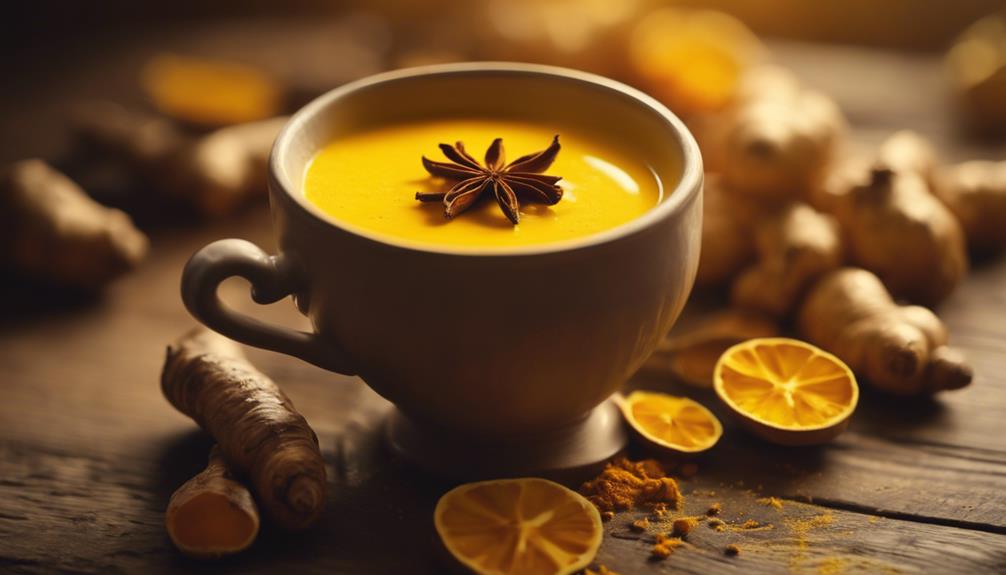
With its vibrant yellow color and versatility in recipes, turmeric can be easily incorporated into a daily diet to reap its anti-inflammatory benefits.
Turmeric can be added to various dishes, such as roasted vegetables, rice, or smoothies, making it a convenient way to incorporate its anti-inflammatory properties.
Another option is to make turmeric lattes or consume curcumin supplements for a consistent intake.
Turmeric's versatility offers multiple options for consumption, catering to individual preferences.
Clinical studies have validated the efficacy of turmeric in reducing inflammation-related symptoms in conditions like osteoarthritis and inflammatory bowel disease.
Synergistic Potential of Turmeric and Ginger
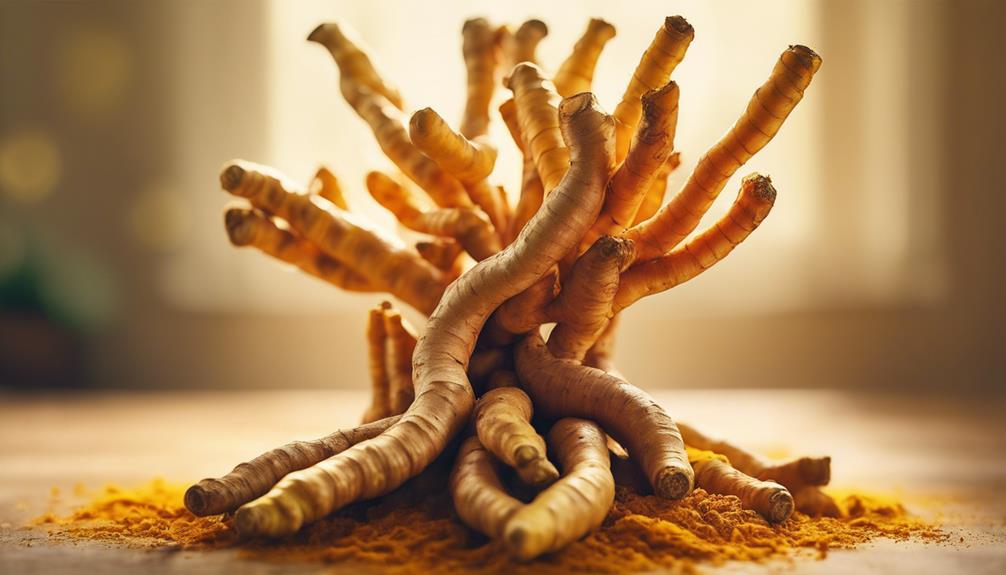
Frequently, the anti-inflammatory effects of turmeric are amplified when paired with ginger, its complementary counterpart in the botanical world. The synergistic potential of these two roots is rooted in their distinct yet complementary mechanisms.
Turmeric's curcumin and ginger's gingerols work in tandem to produce a more profound anti-inflammatory response. This potent duo can be consumed fresh, dried, or powdered, and balanced dosage supplements are available.
Scientific evidence supports the use of turmeric and ginger for their anti-inflammatory properties, offering a holistic approach to inflammation management. By combining these two roots, individuals can maximize the benefits of their anti-inflammatory effects, providing a natural and effective way to manage inflammation-related symptoms.
Turmeric's Inflammation-Fighting Mechanisms

Turmeric's potent anti-inflammatory effects are mediated by curcumin, which suppresses the production of pro-inflammatory enzymes and cytokines, thereby blocking the inflammatory cascade.
Curcumin's anti-inflammatory mechanisms involve inhibiting the activation of nuclear factor kappa B (NF-κB), a transcription factor that regulates pro-inflammatory genes.
In addition, curcumin downregulates the expression of cyclooxygenase-2 (COX-2), an enzyme involved in prostaglandin production, which contributes to inflammation.
Moreover, curcumin's antioxidant properties neutralize free radicals, reducing oxidative stress and inflammation.
These mechanisms collectively contribute to turmeric's anti-inflammatory potency, making it a valuable natural remedy for managing inflammation-related disorders.
Research has consistently demonstrated curcumin's efficacy in reducing inflammation and alleviating symptoms in various chronic diseases.
Safe and Effective Usage Guidelines
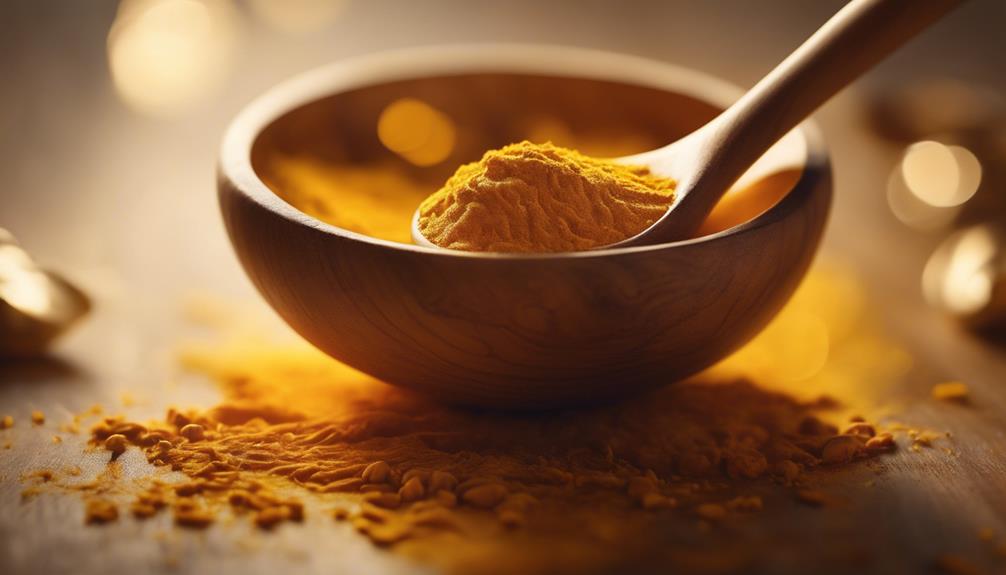
To harness the full benefits of turmeric while minimizing adverse effects, individuals should consult with a healthcare professional before starting a high-dose turmeric regimen, especially for those taking medications or having underlying health conditions. Turmeric can interact with blood thinners, diabetes medications, and blood pressure medications, so caution is advised.
The recommended daily dosage of turmeric varies from 500mg to 2,000mg, depending on the individual's health goals and needs. Additionally, taking turmeric with black pepper and fat can enhance bioavailability.
Maximizing Turmeric's Health Benefits

To fully tap into the full potential of turmeric, it's important to comprehend how to maximize its health benefits, and combining it with other anti-inflammatory compounds is a great starting point.
Curcumin, the active compound in turmeric, has limited bioavailability, but pairing it with piperine, a natural compound found in black pepper, can enhance absorption by up to 2,000%. Additionally, consuming turmeric with fats like olive oil can improve bioavailability.
Moreover, incorporating turmeric into daily routines through teas, smoothies, or soups can provide a convenient way to reap its anti-inflammatory benefits. By understanding how to maximize turmeric's health benefits, individuals can utilize its full potential and effectively manage inflammation.
Frequently Asked Questions
Can I Consume Turmeric if I'm Taking Blood Thinners or Diabetes Medications?
When taking blood thinners or diabetes medications, it's important to exercise caution when consuming turmeric. Turmeric's active compound, curcumin, can interact with these medications, increasing the risk of bleeding or altering blood sugar levels.
As a precaution, individuals should consult their healthcare professionals before adding turmeric to their regimen, as they can help determine safe dosage and potential interactions.
How Long Does It Take to Notice the Anti-Inflammatory Effects of Turmeric?
When consuming turmeric, it typically takes 4-8 weeks to notice the anti-inflammatory effects. This timeframe can vary depending on individual factors, such as dosage, bioavailability, and health conditions.
According to a study published in the Journal of Medicinal Food, 'curcumin supplementation for 4-6 weeks reduced inflammatory biomarkers in patients with metabolic syndrome.'
Consistency and patience are key to experiencing the full benefits of turmeric's anti-inflammatory properties.
Are There Any Known Interactions Between Turmeric and Hormonal Birth Control?
She explores the potential interactions between turmeric and hormonal birth control, an important consideration for women using both. Research suggests that curcumin may increase the risk of bleeding in individuals taking hormonal contraceptives, such as the pill, patch, or ring.
However, no conclusive evidence exists, and more studies are needed to fully understand the effects of this combination. It's essential for women to consult their healthcare provider before adding turmeric supplements to their regimen while using hormonal birth control.
Can I Give Turmeric to My Children for Inflammation and Pain Relief?
When considering turmeric for children's inflammation and pain relief, parents should consult a pediatrician first. Turmeric's active compound, curcumin, is generally recognized as safe for children, but dosage and preparation guidelines vary.
According to the National Institute of Health, 'turmeric is possibly safe for children when used in amounts commonly found in food.' However, high doses may interact with medications, so seeking guidance from a healthcare professional is essential to guarantee safe and effective use.
Can I Use Turmeric Essential Oil Topically for Skin Inflammation and Wounds?
As turmeric's golden essence wafts into the world of skin care, an important question arises: can turmeric essential oil be used topically for skin inflammation and wounds? According to experts, yes, but with caution.
Turmeric essential oil contains sesquiterpenes and turmerones, which have anti-inflammatory and antioxidant properties. However, it's necessary to dilute the oil in a carrier oil and perform a patch test to avoid skin irritation.
Conclusion
In summary, turmeric's golden hue belies its powerful anti-inflammatory prowess, illuminating a path to mitigating chronic diseases.
As research continues to uncover its secrets, this ancient herb emerges as a shining star in the field of natural remedies, its potent curcumin content waiting to be harnessed through strategic consumption methods and synergistic pairings.
As we maximize the full potential of turmeric, a brighter future beckons, where inflammation's dark shadow is overshadowed by the radiant glow of excellent health.
Pain Relief
Effective Herbs for Soothing Nerve Pain
Naturopathic remedies offer a beacon of hope for neuropathic pain sufferers, but which herbs will bring the most relief?

For individuals struggling with neuropathic pain, certain herbs have shown significant promise in alleviating discomfort and inflammation associated with nerve damage. St. John's Wort, known for its antidepressant properties, and turmeric, containing anti-inflammatory curcumin, are effective in reducing pain. Passionflower, a natural sedative, and ginger, with its anti-inflammatory properties, also provide relief. Valerian root, a natural muscle relaxant, can help with pain management. To maximize the benefits of these herbs, it's essential to understand how to incorporate them effectively, considering individual needs, health status, and medication interactions, and by doing so, individuals can find much-needed relief from nerve pain. Further guidance on strategic herbal integration can lead to even greater success.
Key Takeaways
• St. John's Wort is known for its antidepressant properties, which can help alleviate nerve pain symptoms.
• Turmeric contains curcumin, which has potent anti-inflammatory properties that can reduce nerve pain and inflammation.
• Passionflower is a natural sedative that can help reduce anxiety and promote relaxation, providing relief from nerve pain.
• Ginger has anti-inflammatory properties that can help reduce pain and inflammation associated with nerve pain.
• Valerian root is a natural muscle relaxant that can help relieve nerve pain by reducing muscle tension and promoting relaxation.
Understanding Nerve Pain Basics
Nerve pain, also known as neuropathy, occurs when damaged nerves disrupt the normal transmission of signals between the brain and the rest of the body. This disruption can lead to a range of uncomfortable and painful symptoms.
Damaged nerves can be caused by various factors, including diabetes, injuries, infections, autoimmune diseases, and chemotherapy. Understanding the diverse causes of nerve pain is essential for effective management and treatment.
Recognizing Nerve Pain Symptoms

Symptoms of nerve damage can manifest in a variety of ways, often starting with subtle sensations that can escalate into debilitating pain if left untreated. Recognizing these symptoms is essential for effective management of nerve pain.
- Tingling or numbness in hands and feet
- Sharp, stabbing, or burning pain
- Muscle weakness or lack of coordination
- Hyperalgesia or increased sensitivity to pain
- Abnormal sensations, such as feeling of wearing gloves or socks when none are present
Managing Nerve Pain Strategies

By combining medicinal therapies with lifestyle modifications and alternative treatments, individuals can develop a holistic approach to managing nerve pain.
Medicinal therapies, such as anticonvulsants and antidepressants, can alleviate nerve pain.
Lifestyle modifications, including balanced blood sugar levels and regular exercise, can also help.
Alternative treatments like acupuncture and massage therapy have shown positive results in reducing nerve pain.
Early diagnosis is essential for effective management of nerve pain.
A thorough treatment plan should include a combination of these strategies to provide maximum relief.
Natural Herbs for Nerve Relief

Incorporating natural herbs into a holistic treatment plan can provide significant relief from nerve pain, and several herbs have shown remarkable efficacy in alleviating discomfort. These natural remedies can be used in conjunction with conventional treatments to enhance their effectiveness. Herbs have been used for centuries to address various health concerns, and their potential in nerve pain management is substantial.
Some of the most effective herbs for nerve relief include:
- St. John's Wort: Known for its antidepressant properties, it can help alleviate nerve pain symptoms.
- Turmeric: Contains curcumin, a potent anti-inflammatory compound that reduces pain and inflammation.
- Passionflower: A natural sedative that can help reduce anxiety and promote relaxation, alleviating nerve pain.
- Ginger: Possesses anti-inflammatory properties that can help reduce pain and inflammation.
- Valerian root: A natural muscle relaxant that can help reduce nerve pain and promote better sleep.
Using Herbs for Nerve Pain

While the previous herbs mentioned have shown remarkable efficacy in alleviating nerve pain, understanding how to effectively incorporate them into a holistic treatment plan is vital for the best relief. To maximize the benefits of herbal remedies, it is important to take into account individual needs, health status, and potential interactions with medications. A well-planned approach can lead to the best results.
| Herbal Remedy | Administration Methods |
|---|---|
| Turmeric | Capsules, tea, or topical application |
| Passionflower | Tea, tincture, or capsules |
| Ginger | Raw, cooked, or in supplement form |
| Valerian Root | Tea, capsules, or topical application |
| St. John's Wort | Capsules, tea, or tincture |
Frequently Asked Questions
Can Herbal Remedies Interact With Prescription Medications for Nerve Pain?
When exploring herbal remedies for nerve pain, it's important to take into account potential interactions with prescription medications.
Herbal supplements can interact with medications, amplifying or reducing their effects. For instance, St. John's Wort can decrease the efficacy of antidepressants, while turmeric may enhance the effects of blood thinners.
It's vital to consult with a healthcare provider before combining herbal remedies with prescription medications to guarantee safe and effective management of nerve pain.
Are There Any Herbal Remedies Suitable for Children With Nerve Pain?
When it comes to children with nerve pain, parents often wonder if herbal remedies are suitable for their little ones. The answer is, it depends.
While some herbs like chamomile and lavender oil have calming effects, others like St. John's Wort and passionflower may interact with medications or have side effects.
It's essential for parents to consult with their child's healthcare provider before using herbal remedies, as dosage and interactions vary greatly.
How Long Does It Take for Herbal Remedies to Show Nerve Pain Relief?
It's a wild misconception that herbal remedies work overnight, but the reality is that it takes time and patience. Typically, it can take anywhere from a few days to several weeks to notice significant nerve pain relief from herbal remedies.
According to a study published in the Journal of Pain Research, 'the analgesic effects of herbal remedies can take up to 4-6 weeks to manifest.'
Can Herbal Remedies Be Used in Conjunction With Traditional Medicine?
She can combine herbal remedies with traditional medicine, but it's important to consult with a healthcare provider first. This guarantees safe interactions and maximum relief from nerve pain.
According to the National Institute of Neurological Disorders and Stroke, 'herbal remedies can interact with prescription medications, including those for nerve pain.' By doing so, individuals can harness the benefits of both approaches, minimizing potential risks and maximizing pain relief.
Are There Any Herbal Remedies That Can Worsen Nerve Pain Symptoms?
According to the National Institute of Neurological Disorders and Stroke, approximately 20 million people in the United States experience neuropathic pain.
Some herbal remedies, although generally safe, can worsen nerve pain symptoms in certain individuals. For instance, ginkgo biloba can interact with blood thinners, exacerbating bleeding risks, while St. John's Wort can reduce the efficacy of medications, including those for nerve pain.
It's essential to consult a healthcare provider before incorporating herbal remedies into one's treatment plan.
Conclusion
To sum up, herbal remedies have emerged as a promising solution for alleviating nerve pain, with a growing body of scientific evidence supporting their efficacy.
According to the National Institutes of Health, approximately 10% of Americans suffer from neuropathic pain, highlighting the urgent need for effective treatment options.
By incorporating herbs such as St. John's Wort, turmeric, and others into daily life, individuals can find significant relief from the debilitating symptoms of nerve pain, improving their overall quality of life.
-

 Herbalism2 months ago
Herbalism2 months agoDoes Herbalism Actually Work?
-

 Anti Aging2 months ago
Anti Aging2 months agoMost Effective Anti-Aging Drink: 5 Top Picks
-

 Anti Aging2 months ago
Anti Aging2 months agoWhich Tea Increases Lifespan?
-

 Bone Health2 months ago
Bone Health2 months agoHerbal Secrets Unleashed: Boost Bone Density
-

 Anti Aging2 months ago
Anti Aging2 months agoThe Immortal Herb: Unveiling Its Special Qualities
-

 Anti Aging1 month ago
Anti Aging1 month agoAstragalus: The Ultimate Anti-Aging Herb
-
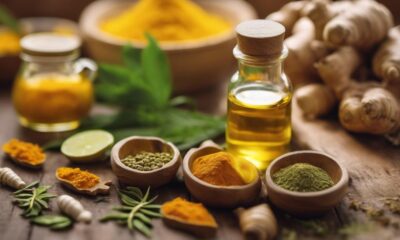
 Inflammation Management2 months ago
Inflammation Management2 months agoBest Natural Medicines for Joint Inflammation Relief
-
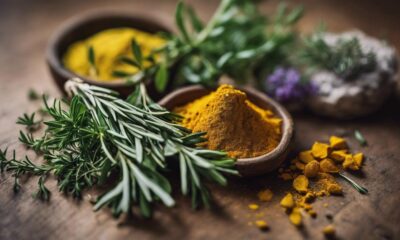
 Mental Health2 months ago
Mental Health2 months agoBest Herbs for Boosting Brain Health


















